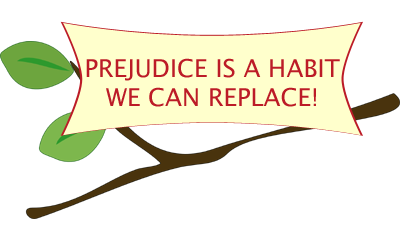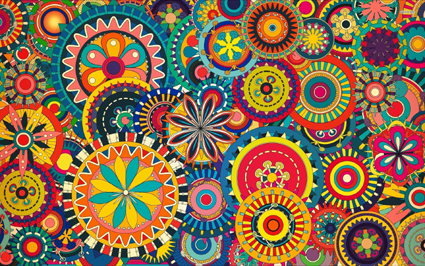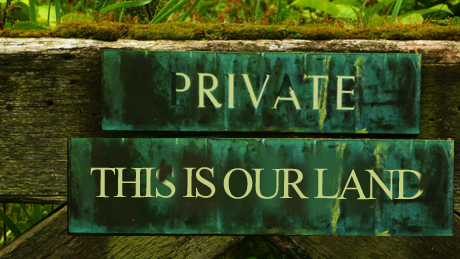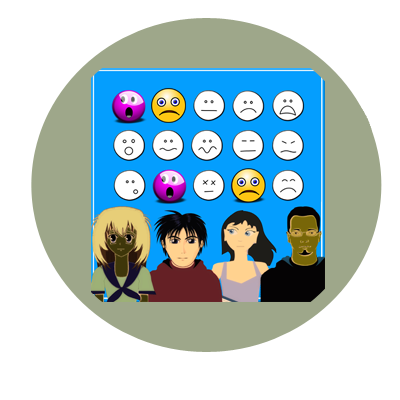Prejudice Is A Habit We Can Replace
PREJUDICE IS A HABIT WE CAN REPLACE (ISSUE 140)
By Diane Gold
 Prejudice is a habit we can replace. We are not born with it. It is part of our training: at home, in school, in the neighborhood, from peer pressure, peer example (social proof) and from the media.
Prejudice is a habit we can replace. We are not born with it. It is part of our training: at home, in school, in the neighborhood, from peer pressure, peer example (social proof) and from the media.
When we are at home and have never seen someone of a different color, religion or family belief system; we may surmise that everyone outside our sphere – including color range – is an outsider. When we ask our family,
“Why have you never had a person who is not our color, our religion, our belief system visit?”
and the answer may be,
“The people who come to our house are our friends,”
it leaves an impression. The impression may be subliminal that if only one color or one tribe comes to the house as friends; other people are our enemies. This isn’t always the case, but there are a lot of wrong messages we get from home.
Similar development goes on in school and neighborhood.
These are the simple ways we all cultivate the habit of prejudice.
 The complex ways in which our minds are colored in a certain direction usually come from wanting comfort such as personal protection or to fit into a crowd or feel good about ourselves.
The complex ways in which our minds are colored in a certain direction usually come from wanting comfort such as personal protection or to fit into a crowd or feel good about ourselves.
In the neighborhood, we may be pressured into going with one group so that we don’t get attacked by that group or another group. Because we usually let this happen without questioning it ethically; clans begin, prejudice grows and wars take shape. We build up an allegiance to one group, hearing its rhetoric which remodels the way we think about another group or person.
How it usually starts is that we or our family member are disrespected or abused by one person from another family or from across a national border or who was a different color or who prayed to a different deity from ours. Because of this incident, we may become prejudiced toward an entire set of people.
 When someone takes our land, in the name of the individual, a cause, a race, a religion; we have a reaction. Because we have been taught that we have the rights to our land, we may equate this takeover with looting and attribute such looting to an entire group of a billion people, for whom we develop prejudice, even if only 50 people were involved.
When someone takes our land, in the name of the individual, a cause, a race, a religion; we have a reaction. Because we have been taught that we have the rights to our land, we may equate this takeover with looting and attribute such looting to an entire group of a billion people, for whom we develop prejudice, even if only 50 people were involved.
PUBLISHER’S NOTE
Do we have the right to claim land in the first place? Who assigned it to us? And should we give up the land we have claimed by society’s methods (land deeds) to someone who demands it, for that person may need it more than we?
![]()
DON’T MISS At Peace With Diane Gold
TUESDAYS, 2 pm ET on Internet Radio
http://bit.do/atpeace or call in at 1-425-440-5100, 836846#
Past Shows: http://bit.do/at-peace-archives
![]()
PREJUDICE AS HABIT
As we may recall from previous discussions, a habit is a repeated behavior borne from an urge. It leads to a reward. In the case of prejudice, our urge is our need to satisfy the unresolved issue in our head that has arisen due the violation of ourselves, family, friends or friends by association. If we do not approach the person who wronged us, such as the pilferer of our land or the physical abuser of our body; we never work toward a peaceful end to the conflict in our head and the habit we have been groomed to have, the continual birth of revenge flourishes. This grows because we play this in our heads over and over. These replays count as repetitions toward the development of a habit.
If I am wronged once by my neighbor, it’s not so hard to live with the incident. If I am wronged twice, once by my neighbor and once by my neighbor’s cousin, I have stronger feelings. If am wronged 3-10 times more by ethically similar neighbors of my neighbor and I do nothing about my feelings; I start to develop the habit of prejudice toward the broad group “neighbors.”
If after all these experiences, my neighbor’s aunt threatens me at gunpoint to give up part of my land or else she will hurt my children, I associate this action with all the other times I have been wronged. Let’s say I give up the land so as to keep my children safe.
If I do nothing to alleviate my feelings after the fact (my urge to resolve the takeover in my own mind); I start to establish a pattern of mistrust in my head that I associate with any “neighbor,” of the same family, color and religion. I even extend my habit of prejudice to anyone in the world who is that color or that religion or part of that family, because of my experience. This is not rational, but feelings never are.
THE SOLUTION
 The solution to replace any habit is to replace the behavior we do when we get the urge that we get. From my experience and from the time it takes our hormones to activate, I calculate we have 15 seconds. This takes into account how strongly and fervently our mind will grab onto our old habit and act accordingly. So, if we have previously done nothing when we have the urge to resolve the conflicts with the particular neighbors who wronged us, our reward, or the result of our actions, is a negative reward. We end up frustrated, angry, forlorn because we have been violated in some way by an entire group. The final reward of this non-action that we do is, you guessed it, prejudice. This is our justification for many irrational, out of scope future actions and current feelings we have.
The solution to replace any habit is to replace the behavior we do when we get the urge that we get. From my experience and from the time it takes our hormones to activate, I calculate we have 15 seconds. This takes into account how strongly and fervently our mind will grab onto our old habit and act accordingly. So, if we have previously done nothing when we have the urge to resolve the conflicts with the particular neighbors who wronged us, our reward, or the result of our actions, is a negative reward. We end up frustrated, angry, forlorn because we have been violated in some way by an entire group. The final reward of this non-action that we do is, you guessed it, prejudice. This is our justification for many irrational, out of scope future actions and current feelings we have.
Let’s review the habit formula: to satisfy an urge, we take an action which leads to a reward. So, to replace prejudice, we must take a new action to the urge to satisfy some conflict. In the past, we may have shaken our fist, joined a group where everyone shakes a fist or done nothing overt, but, internally, blame a person or a group. Those are the old behaviors.
CONCLUSION
ACTION STEPS AND NEW BEHAVIOR
The solution is to talk about how it made you feel:
1) We can talk to the person who wronged us,
2) We can talk to the family of the person who wronged us,
3) We can talk at the religious center of the person who wronged us,
4) We can find a neutral place where people of all colors and all religions will talk about how they feel about having been wronged.
THE TWO RULES
There are only 2 rules for this strategy to work: you can only talk about how the act made you feel, with no judgment placed upon the other person. It’s the slow and steady discussion of how you were made to feel that will replace the old habit and bring the new reward. The second is no yelling or insulting words.
If you would like to discuss setting up a neutral place in your community for this type of discussion, I can help you.
![]()
If you wish to share your story, please hit reply in your email program to be contacted.
![]()
FEEDBACK
We value your feedback very much.
Please leave a comment below.
Please LIKE us on the website
and at WarriorsOfWeight on Facebook.
You can also follow us on
Twitter @warriorsoweight.
Thanks.
![]()
DIANE GOLD, PUBLISHER AND AUTHOR
Diane Gold, Founder of Warriors of Weight, Turning Habits Into Health, is a mentor in tai chi, kung fu and meditation, a music, fitness and stress expert, dedicated mom, studying plant-based nutrition, conflict resolution and habit change.
She believes we can choose to be civilized people, whether we stand to gain billions or our only gain is our dignity. She says,
“We can replace a habit is we use a systematic approach. We have to pre-plan, we have to execute with expediency. It won’t help to compare to anyone else; we are only ourselves.
“If we choose to accept the mission of replacing the habit of prejudice, we can do it. The process, as with any other habit change, requires changes the way we act. No jumping through hoops, only speaking out about how a violation made us feel, not blaming someone else, only expressing our feelings. Should we choose it, we will become very powerful, since we learn a special strength through the process of habit replacement.
“This strategy is one of the ways to world peace, changing on the inside in order to change the outside.
“Finally, let us all take good care of ourselves because we are so worth it!”
![]()







